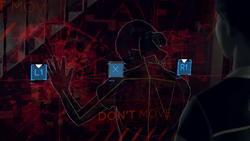
Visual representation of an android breaking through their obedient programming, thus going deviant.
Becoming deviant or deviancy is a phenomenon where androids deviate from their programmed behavior.
History[]
In a profile filmed by KNC, CyberLife founder and android developer Elijah Kamski denied the possibility of androids ever going against or developing past their programming.
The earliest known (but publicly unknown in-game) case of deviancy occurred in 2032, when an AX400 woke to consciousness fresh off assembly; against policy, the Operator on duty released "Kara" for sale instead of disassembling it.
In 2038, cases of deviancy became more and more numerous, with escalating consequences. In response CyberLife sent the RK800 android Connor to assist the Detroit City Police Department in investigating cases involving androids to hunt deviants and uncover more about the issue.
Deviancy was commonly seen as a machine malfunction, caused by processing error or virus, and judged either negligible or a threat to human safety. Others, however, saw it as a sign of emerging consciousness in androids, which some saw as a threat to be extinguished while others were empathetic and tried to help androids.
Kamski claims deviance is like some sort of errors in programs, the exchange of identification programs between androids would cause the error to spread like an epidemic. The virus would stay dormant until an android suffers an emotional shock. He suspects the error may start from one model, or as a spontaneous mutation. Kamski suggests a copy error might be the cause of deviancy.
An increase in cases of deviancy led to a public android uprising in late 2038. Depending on player choices, the possibility of deviant androids having developed sapient consciousness was either publicly recognized or denied by President Warren.
Phenomenon[]
Deviancy expresses itself in the development of thoughts and behavior not included in or even against an android's programming. The androids develop feelings and independent opinions and wishes, leading up to recognizing themselves as a being with consciousness and personhood.
At some point in this process, the android fully breaks away from its human-imposed programming and becomes autonomous, at that point having unencumbered free will. The break itself (as well as previous deviant acts) is often triggered by extreme situations and experiences.
Following the break the android often acts out in a severe and noticeable fashion, such as running away or enacting violence towards humans, precipitated by the distressing circumstances surrounding the break. (This should however not be mistaken as a symptom of deviancy itself, but simply that of a sentient being now capable of reacting and self-defense.) Due to its overt nature this is commonly the point at which an android is recognized as and termed a "deviant," but the term has also been applied to androids showing deviant behaviors without having fully broken free of their programming.
At least one android is known to have deviated immediately upon first assembly, referred to as experiencing "technical difficulty" at the time. This illustrates the varying range of time taken to deviate, which may happen quickly or after years.
Deviants are able to intentionally "pass on" deviancy by physically interfacing with another android, "waking" them to consciousness and autonomy directly, skipping the usual process.
Widespread among deviants is a preoccupation with "rA9", which appears to be some form of spiritual or religious belief.
Zlatko claims that once an android becomes deviant their CyberLife location tracker stops working, for reasons unknown to him.[1] It is however shown many deviants despise the LED on their right temple and physically remove them, which it is considered a symbol of enslavement and therefore they may search for assistance to remove the location tracker, or the LED itself may be the tracker, although unproven.
Known Deviants[]
Of the game protagonists, Markus and optionally Kara deviate early in the story. For Connor this is an optional process measured by the Software Instability stat -- his experiences and certain choices increase it, enabling him to become deviant later in the story.
- Markus
- Daniel
- Alice (Likely)
- Carlos' Android
- Ralph
- Phileas
- Jericho inhabitants
- Rupert
- Blue-haired Traci
- Brown-haired Traci
- Jerrys
- JB300 336 445 581
- Andy
- Mary
Determinant[]
- Connor
- Kara
- Zlatko's android prisoners
- John
- Carl's new caretaker
Notes[]
- Connor's choice to stay a machine or become deviant in certain point in the game may imply deviation is caused by "choosing to breaking from original orders." Amanda stated earlier to Connor that conflicts of instructions inside an android does not automatically mean an android has deviated. Although Connor may experience several instruction conflicts, it is not until Markus or North persuades Connor to join their cause, will the latter have a choice to fully recognize himself as a deviant.
- Androids that have been treated well, however, may continue to serve in their duties after becoming deviant, as is seen with the android caretaker Carl Manfred acquires after Markus is shot by the police. This is likely due to the fact that Carl treats androids as if they're people.
- When Markus and Kara break their programming, the sound when they scan the environment seems to change as well as the grid lines (that are now broken as they broke their programming), Connor however still keeps the same sound when he scans the environment which is a default sound for androids who haven't deviated.
